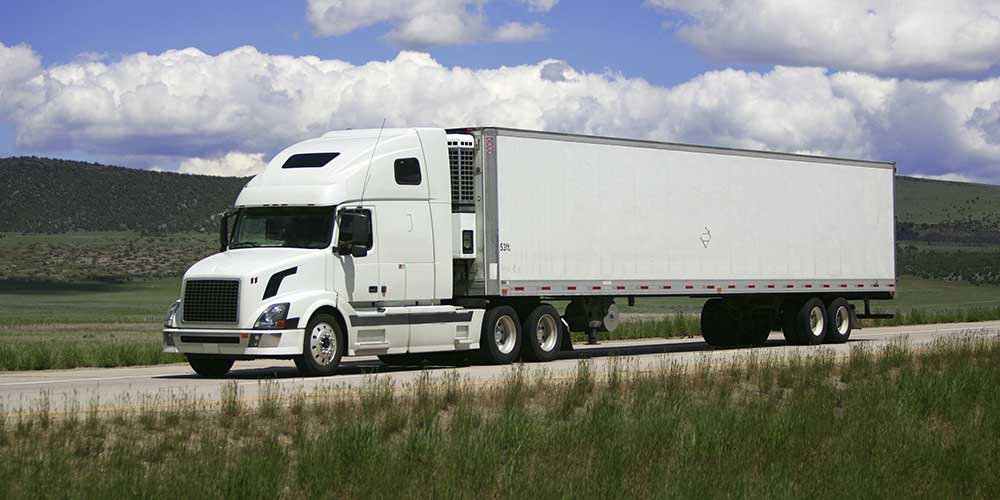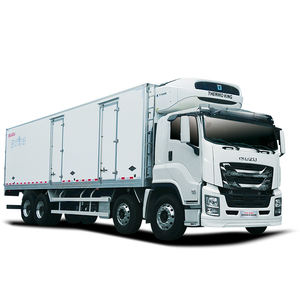Reefer Trucks Thermo King: Blazing A Trail in Cold Chain Innovation
Reefer Trucks Thermo King: Blazing A Trail in Cold Chain Innovation
Blog Article
Top Technologies in Transportation Refrigeration: Enhancing Performance and Security
The landscape of transport refrigeration is going through significant improvement, driven by technologies aimed at boosting both performance and safety. As these advancements proceed to evolve, it is essential to explore their ramifications on operational methods and regulative compliance, motivating a better examination of just how they reshape the future of transportation refrigeration.
Smart Temperature Checking Solutions
In the realm of transportation refrigeration, clever temperature tracking systems have actually become a crucial technology for ensuring the stability of temperature-sensitive goods. These advanced systems utilize Internet of Points (IoT) technology to provide real-time data on temperature level variations, enabling operators to maintain optimal conditions throughout the supply chain. By continuously tracking the temperature of refrigerated containers and cars, companies can swiftly identify deviations that may compromise item top quality.

Moreover, smart tracking systems often integrate automated signals and notifications, enabling stakeholders to respond promptly to any kind of prospective problems. This aggressive approach not just minimizes the threat of perishing yet also improves conformity with regulatory requirements controling food safety and security and pharmaceutical transport.
The combination of information analytics within these systems additionally helps with predictive upkeep, aiding drivers to foresee prospective devices failings prior to they take place. This capacity reduces downtime and optimizes operational effectiveness, eventually bring about set you back financial savings.
Eco-Friendly Refrigerants
Smart temperature level monitoring systems play an essential function in keeping product top quality, but the performance of transport refrigeration likewise rests on the option of cooling agents used. As environmental problems rise, the change in the direction of environment-friendly refrigerants has actually become critical. Conventional cooling agents, such as hydrofluorocarbons (HFCs), are infamous for their high Global Warming Prospective (GWP), adding significantly to climate modification. In comparison, emerging alternatives like hydrocarbon-based refrigerants and hydrofluoroolefins (HFOs) existing reduced GWP options, providing both effectiveness and sustainability.
These eco-friendly refrigerants not only minimize environmental impact but also align with global policies targeted at phasing out damaging compounds. Their adoption can result in enhanced energy efficiency, ultimately reducing operating costs for transport refrigeration systems. Furthermore, making use of natural cooling agents, such as ammonia and co2, has actually gotten traction due to their excellent thermodynamic homes and lower environmental impact.
Purchasing green cooling agents is not merely a governing conformity step; it represents a critical decision that enhances brand name credibility and fosters consumer loyalty. thermo king truck refrigeration. By prioritizing lasting practices, firms can contribute to a greener future while ensuring the stability of transferred items
Advanced Insulation Materials
Making use of sophisticated insulation products is vital for optimizing transport refrigeration systems, as they significantly improve power effectiveness and keep constant temperature level control. Traditional insulation approaches frequently drop brief in avoiding thermal transfer, causing increased energy intake and fluctuating temperature levels within chilled compartments.
Arising products such as vacuum shielded panels (VIPs) and aerogels offer superior thermal resistance, permitting thinner profiles without endangering performance. VIPs, for example, make use of a vacuum layer to reduce convective and conductive heat transfer, making them optimal for space-constrained applications. Aerogels, recognized for their lightweight and porous framework, provide extraordinary insulation while dramatically reducing overall system weight.
Furthermore, including stage adjustment products (PCMs) into insulation systems can further support temperatures throughout transportation. These products take in and launch thermal power, properly buffering versus exterior temperature level variants.
The assimilation of these innovative insulation products not just lowers the functional prices related to power intake yet additionally expands the life span of temperature-sensitive goods. As the transport refrigeration industry remains to develop, the adoption of innovative insulation technologies will certainly be crucial in boosting both performance and safety and security in cooled transport.
Automated Path Optimization
The efficiency of transport refrigeration systems is greatly boosted via automated path optimization, which leverages real-time information and sophisticated algorithms to determine one of the most reliable paths for delivery. By analyzing numerous aspects such as web traffic patterns, weather problems, and shipment windows, these systems can dramatically minimize travel time and gas usage.
Automated route optimization minimizes human mistake and subjective decision-making, which can result in inefficiencies. This modern technology allows fleet managers to allot resources better, ensuring that refrigerated items keep their required temperature level throughout the trip. By enhancing routes, firms can likewise boost customer fulfillment with timely shipments.
Furthermore, automated systems can adjust to unexpected conditions, such as road closures or abrupt traffic spikes, permitting for dynamic rerouting. This versatility not just safeguards the honesty of temperature-sensitive products however additionally adds to general functional effectiveness.
Applying automated route optimization can lead to significant cost savings while lowering the carbon footprint connected with transport. As businesses progressively focus on sustainability, this innovation stands apart as a crucial component in contemporary transportation refrigeration, straightening operational goals with environmental obligation. Inevitably, automated course optimization represents a significant development in the mission for performance and safety and security in transport refrigeration.

Real-Time Information Analytics
Automated path optimization substantially take advantage of the assimilation of real-time data analytics, article which provides essential insights right into the efficiency of transport refrigeration systems. By making use of real-time data, transportation operators can check temperature variations and devices performance, making sure that perishable items are kept within called for parameters throughout transportation. This positive approach not only improves the top quality of the moved products yet likewise minimizes the risk of perishing and loss.

Along with improving effectiveness, real-time analytics improves safety and security by making sure compliance with governing requirements for temperature control. This not just secures public health yet likewise fortifies a firm's credibility - thermo king truck refrigeration. As the transport refrigeration market evolves, the assimilation of real-time data analytics arises as a cornerstone for driving technology, sustainability, and operational quality
Conclusion
In final thought, the innovations in transportation refrigeration significantly enhance both efficiency and security within the market. Jointly, these technologies stand for a critical evolution in transport refrigeration, guaranteeing compliance with regulative requirements and promoting a greener future.
The landscape of transport refrigeration is going through significant change, driven by developments aimed at improving both effectiveness and safety.Smart temperature monitoring systems play a vital role in keeping item top quality, however the efficiency of transport refrigeration also hinges on the selection of cooling agents utilized. Their adoption can lead to enhanced power performance, eventually decreasing operating costs for transportation refrigeration systems. Inevitably, automated path optimization represents a significant innovation in the pursuit for effectiveness and safety in transportation refrigeration.
In verdict, the developments in transport refrigeration dramatically improve both efficiency right here and safety and security within the sector.
Report this page